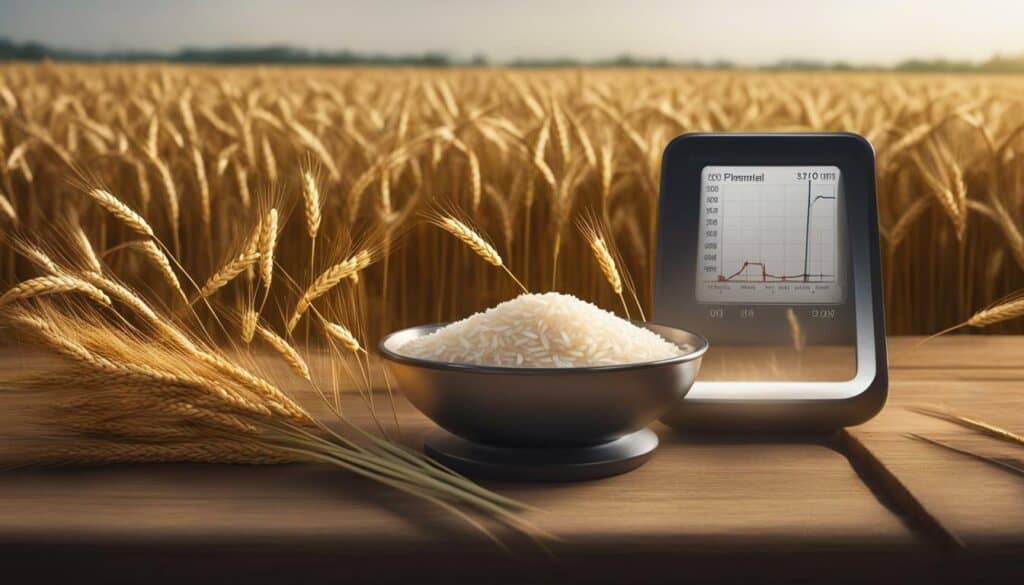Energy plays a crucial role in understanding the nutritional value of food and making informed dietary choices. When we talk about energy in nutrition, we are referring to the capacity of food to provide us with the fuel we need to perform daily activities and maintain optimal health. It is important to grasp the concept of energy in nutritional information as it affects weight management and overall well-being.
Macronutrients, including carbohydrates, proteins, and fats, are the primary sources of energy in our diet. Each gram of carbohydrate or protein provides four calories, while fat provides nine calories per gram. Understanding the energy content of these macronutrients can help guide our food choices and portion control.
Energy is measured in calories (kcal) or joules (J). Calories are commonly used on food labels and refer to kilocalories. Knowing how to interpret this information can aid in understanding the energy value of different foods and beverages.
Carbohydrates are the body’s preferred source of energy. Consuming carbohydrates provides the fuel needed for brain function, physical activity, and other bodily processes. Excess carbohydrates are stored in the body as glycogen, which can be tapped into when energy needs increase, such as during exercise or prolonged periods of fasting.
When carbohydrate stores are depleted, the body turns to fat metabolism as an alternative energy source. Fat is stored in adipose tissue and can be broken down to release energy when needed. This process is crucial for maintaining energy levels and supporting overall bodily functions.
Protein, although primarily known for its role in tissue repair and growth, can also be used as an energy source. However, the body typically reserves protein for other essential functions and only relies on protein as an energy source when other sources are limited.
It is important to note that alcohol provides calories but is not a significant energy source. In fact, alcohol can have negative effects on performance and overall health when consumed excessively.
Understanding energy in nutritional information is key to making informed dietary choices. By knowing how to interpret food labels, understanding portion sizes, and recognizing the energy content of different macronutrients, we can make conscious decisions to support our overall health and well-being.
Key Takeaways:
- Energy in nutrition refers to the capacity of food to provide the fuel our bodies need to function.
- Macronutrients (carbohydrates, proteins, and fats) are the primary sources of energy in our diet.
- Carbohydrates are the body’s preferred source of energy and are stored as glycogen.
- When carbohydrate stores are depleted, the body turns to fat metabolism as an alternative energy source.
- Protein can be used as an energy source but is primarily reserved for other essential functions in the body.
- Alcohol provides calories but is not a significant energy source and can have negative effects on performance.
The Role of Energy in Our Daily Diet
Energy, as indicated on food labels, represents the amount of calories or joules derived from the macronutrients present in the food we consume. Understanding the role of energy in our daily diet is crucial for maintaining overall health and making informed food choices. The energy value of a food item is a reflection of the potential energy it can provide to the body when metabolized.
Macronutrients, such as carbohydrates, proteins, and fats, contribute to the energy content of our diet. Carbohydrates and proteins both provide approximately four calories per gram, while fats provide nine calories per gram. Water, vitamins, and minerals do not contribute to calorie intake. By understanding the energy values of these macronutrients, we can better balance our diet and manage our weight effectively.
Interpreting energy values on food labels can help us make informed dietary choices. Food labels often provide the energy content per serving, allowing us to understand how much energy we are consuming from a particular food item. It is important to pay attention to portion sizes and the number of servings consumed, as this can greatly impact our overall energy intake.
| Macronutrient | Energy Value (per gram) |
|---|---|
| Carbohydrates | 4 calories |
| Proteins | 4 calories |
| Fats | 9 calories |
By being aware of the energy values of different macronutrients and understanding how to interpret food labels, we can make informed choices to maintain a balanced diet. It is essential to consider not only the energy content of our food but also its nutritional value and overall contribution to our health and well-being.
Understanding Energy Measurement in Nutrition
Energy content in food is measured in calories (kcal) or joules (J), which represent the amount of potential work that can be derived from the food. These units of measurement help us understand the energy value of different foods and make informed choices about our diet. One calorie (kcal) is the energy needed to raise the temperature of one kilogram of water by one degree Celsius, while one joule (J) is the energy required to exert a force of one newton over one meter. These measurements allow us to quantify the energy content of food and understand how it can be utilized by our bodies.
| Nutrient | Energy Content |
|---|---|
| Protein | 4 kcal/g |
| Carbohydrates | 4 kcal/g |
| Fat | 9 kcal/g |
It’s important to note that water, vitamins, and minerals do not contribute to calorie intake as they do not provide energy. However, they play crucial roles in supporting various bodily functions and overall health.
Understanding energy measurement in nutrition allows us to evaluate the caloric value of foods and make informed decisions about our dietary intake. By knowing the energy content, we can better manage our weight, maintain a balanced diet, and achieve our health goals. It is crucial to read food labels and be mindful of portion sizes to ensure we are consuming an appropriate amount of energy from various macronutrients.
Macronutrient Contributions to Energy
Carbohydrates, fats, and proteins are macronutrients that provide the body with the necessary energy to function. Each macronutrient plays a unique role in fueling our bodies and maintaining overall health. Understanding how these nutrients contribute to energy production can help us make informed dietary choices.
Carbohydrates are the body’s primary and preferred source of energy. When consumed, carbohydrates are broken down into glucose, which is used by cells for immediate energy or stored as glycogen in the liver and muscles for future use. One gram of carbohydrates provides four kilocalories (kcal) of energy. It is important to consume an adequate amount of carbohydrates to ensure optimal energy levels and support physical activity.
Fats, although often demonized, are an essential part of a healthy diet. They play a vital role in energy storage and provide a concentrated source of fuel. When the body needs energy and carbohydrates are limited, it turns to fats for energy. Fats provide nine kcal per gram, making them a more efficient source of energy compared to carbohydrates and proteins. However, it is important to choose healthy sources of fats, such as avocados, nuts, and olive oil, to support overall health and prevent cardiovascular diseases.
| Macronutrient | Energy Contribution (kcal/gram) |
|---|---|
| Carbohydrates | 4 kcal |
| Fats | 9 kcal |
| Proteins | 4 kcal |
Proteins, although primarily known for their role in building and repairing tissues, can also be utilized as an energy source. However, proteins are not the body’s preferred source of energy and are typically reserved for other essential functions. Like carbohydrates, proteins provide four kcal per gram. It is important to consume an adequate amount of protein to support muscle growth and maintenance, but it is not necessary to rely solely on proteins for energy.
Understanding the contributions of carbohydrates, fats, and proteins to energy production is crucial for maintaining a balanced diet and supporting overall health. By incorporating all three macronutrients into our meals and snacks, we can ensure a steady supply of energy and provide our bodies with the fuel they need to function optimally.

Carbohydrates are the body’s primary source of energy and are stored as glycogen in the liver and muscles. When we consume carbohydrates in our diet, they are broken down into glucose, which is used by our cells as fuel. This process is crucial for providing energy to perform daily activities and sustain bodily functions.
Glycogen, the stored form of glucose, serves as a readily available energy source for our bodies. It acts as a fuel reserve that can be accessed when needed, such as during physical exertion or extended periods without food intake. The liver and muscles store glycogen, ensuring a constant supply of energy.
It’s important to consume an adequate amount of carbohydrates to support energy needs. Complex carbohydrates, such as whole grains, legumes, and vegetables, provide a steady release of energy due to their fiber content, promoting satiety and stable blood sugar levels. Simple carbohydrates, found in fruits and refined sugar, can provide quick bursts of energy but may lead to a rapid rise in blood sugar levels, followed by a crash.
Incorporating a variety of carbohydrate sources in our diet can help ensure a balanced intake of other essential nutrients. Fiber-rich carbohydrates also contribute to digestive health and can help prevent chronic diseases such as heart disease, diabetes, and certain types of cancer.
In summary, carbohydrates are the body’s preferred source of energy, stored as glycogen in the liver and muscles. Consuming a mix of complex and simple carbohydrates can provide sustained energy throughout the day. However, it is important to choose carbohydrates wisely, opting for those that are nutrient-dense and offer additional health benefits.
Fat Metabolism When Carbohydrate Stores are Depleted
When carbohydrate stores are used up, the body turns to fat metabolism for energy. Fat is an essential nutrient that plays a vital role in our overall health and well-being. It is the most concentrated source of energy, providing nine kilocalories (kcal) per gram, compared to four kcal per gram from carbohydrates and proteins. This makes fat a highly efficient fuel source for the body.
During periods of prolonged exercise or fasting, when carbohydrate stores are depleted, the body begins breaking down stored fat into fatty acids and glycerol. These fatty acids are then transported to the liver, where they are converted into ketone bodies for energy production. The ketone bodies can be used by the muscles, brain, and other organs as an alternative fuel source.
It’s important to note that while fat metabolism provides a significant source of energy, the process takes longer compared to carbohydrate metabolism. This is because the breakdown of fat requires more oxygen and is a more complex process. As a result, the body relies primarily on carbohydrates during high-intensity activities that require quick bursts of energy. However, during low-intensity activities and longer durations, the body can effectively utilize fat as an energy source.
| Type | Kilocalories per Gram (kcal/g) |
|---|---|
| Carbohydrates | 4 kcal/g |
| Proteins | 4 kcal/g |
| Fats | 9 kcal/g |
Benefits of Fat Metabolism
“Fat metabolism provides a sustainable and abundant source of energy for prolonged activities and periods without food.”
Fat metabolism offers several benefits for the body. Firstly, it helps in maintaining a steady supply of energy during endurance activities or when food is not readily available. Our bodies have a vast storage capacity for fat, making it an efficient energy source to sustain long-duration exercise or fasting periods. Additionally, fat metabolism contributes to the preservation of carbohydrate stores, which are vital for high-intensity efforts.
Moreover, fat metabolism plays a crucial role in weight management. By utilizing stored fat as an energy source, the body can reduce its fat stores, leading to potential weight loss. This is why low-carbohydrate, high-fat diets, such as the ketogenic diet, have gained popularity for promoting fat burning and weight loss.
Incorporating physical activity and a balanced diet that includes healthy fats, along with carbohydrates, proteins, vitamins, and minerals, is key to maintaining a healthy metabolism and overall well-being.

Protein serves various important functions in the body and is primarily used for building and repairing tissues, rather than as an energy source. However, in certain situations, such as during prolonged fasting or extreme caloric restriction, protein can be broken down and converted into glucose through a process called gluconeogenesis, providing a limited amount of energy.
It is important to note that the body prefers to use carbohydrates and fats as the main sources of energy, as they are more efficiently metabolized and readily available. Protein is typically spared from being used as an energy source and instead, plays a crucial role in maintaining and preserving lean body mass.
Protein is made up of amino acids, which are essential for the synthesis of enzymes, hormones, and antibodies. These amino acids are also involved in numerous metabolic processes that support overall health and well-being. While protein does contribute to the body’s energy needs, it is important to prioritize adequate protein intake for its other vital functions and focus on consuming a balanced diet that includes carbohydrates and fats for energy.
Table: Protein Content in Common Foods
| Food | Protein Content (per 100g) |
|---|---|
| Chicken Breast | 31g |
| Salmon | 22g |
| Greek Yogurt | 10g |
| Quinoa | 14g |
| Black Beans | 8g |
As seen in the table above, various foods contain different amounts of protein, making it important to include a variety of protein sources in your diet. Incorporating lean meats, fish, dairy products, legumes, and whole grains can help ensure an adequate protein intake to support overall health and well-being.
Understanding the role of protein in the body and its contribution to energy production is key to maintaining a balanced and nutritious diet. While protein does have a role in energy metabolism, its primary function lies in tissue repair and growth. By making informed dietary choices and consuming a diverse range of protein-rich foods, you can support your body’s needs and promote optimal health.

While alcohol provides calories, it is not a significant energy source and can have negative effects on performance. Alcohol is metabolized differently than other macronutrients, and its consumption can interfere with the body’s energy metabolism process.
Alcohol contains seven calories per gram, almost as much as fat. However, unlike other macronutrients, alcohol does not provide any essential nutrients or contribute to our body’s energy needs. When consumed, alcohol is prioritized for metabolism and is burned off before the body can efficiently metabolize other energy sources.
Moreover, alcohol can impair nutrient absorption and disrupt normal metabolic functions. Excessive alcohol consumption can lead to nutritional deficiencies, dehydration, and liver damage, which can further impact overall energy levels and performance.
“While alcohol provides calories, it is not a significant energy source and can have negative effects on performance.”
Effects of Alcohol on Energy Metabolism
| Impact Areas | Effects |
|---|---|
| Nutrient Absorption | Alcohol can interfere with the absorption of essential nutrients, including vitamins and minerals, which play a crucial role in energy production. |
| Glycogen Storage | Alcohol disrupts glycogen synthesis, the storage form of carbohydrates in the body. This can lead to decreased glycogen stores and impaired energy availability. |
| Dehydration | Alcohol is a diuretic that promotes fluid loss, leading to dehydration. Dehydration can negatively affect physical and mental performance. |
| Liver Function | Alcohol places strain on the liver and can damage liver cells, impairing the organ’s ability to process nutrients and produce energy effectively. |
It is essential to consume alcohol in moderation, as excessive or chronic alcohol consumption can have severe implications for overall health and energy levels. Understanding the impact of alcohol on energy metabolism can help individuals make informed choices and maintain a balanced and healthy lifestyle.

Understanding the role of alcohol in energy metabolism is crucial for individuals looking to optimize their nutritional intake and performance. While moderate alcohol consumption may be enjoyed in social settings, it is important to prioritize water and other nutrient-rich beverages for optimal energy and overall well-being.
Conclusion
Understanding the concept of energy in nutritional information is vital for managing weight, maintaining overall health, and making informed food choices. Energy, in the context of nutrition, refers to the capacity of macronutrients like carbohydrates, proteins, and fats to provide fuel for our bodies.
Energy is measured in calories (kcal) or joules (J), with one gram of protein or carbohydrate providing four kcal and one gram of fat providing nine kcal. Water, vitamins, and minerals do not contribute to calorie intake. It’s important to note that calories can also be referred to as kilocalories (kcal) or joules (J).
Carbohydrates are the body’s preferred source of energy and are stored as glycogen. When carbohydrate stores are depleted, the body turns to fat metabolism as an energy source. Protein is primarily reserved for other essential functions in the body, but it can be used as an energy source when necessary.
Alcohol provides calories, but it is not a significant energy source and can have negative effects on performance. It’s crucial to interpret food labels correctly and understand portion sizes to make healthy food choices based on energy content.
FAQ
Q: What does energy mean in nutritional information?
A: Energy in nutrition refers to the capacity to do work and is derived from the macronutrients we consume.
Q: How is energy measured in nutrition?
A: Energy is measured in calories (kcal) or joules (J).
Q: What is the energy content of protein, carbohydrates, and fats?
A: One gram of protein or carbohydrates provides four kcal, while one gram of fat provides nine kcal.
Q: Which macronutrient is the body’s preferred source of energy?
A: Carbohydrates are the body’s preferred source of energy and are stored as glycogen.
Q: What happens when carbohydrate stores are depleted?
A: When carbohydrate stores are depleted, fat metabolism becomes the source of energy.
Q: Can protein be used as an energy source?
A: Protein can be used as an energy source, but it is primarily reserved for other essential functions in the body.
Q: Does alcohol provide significant energy?
A: Alcohol provides calories but is not a significant energy source and can have negative effects on performance.
Q: Why is it important to understand energy in nutritional information?
A: Understanding energy in nutritional information is crucial for managing weight and making informed food choices.
Is the Energy Content Listed in Bagel Nutritional Information Important?
When examining bagel nutrition facts revealed, the energy content listed is indeed significant. It helps individuals understand the amount of calories they will consume when indulging in a bagel. Being aware of the energy content can aid in making informed dietary choices and maintaining a balanced lifestyle.








Leave a Reply